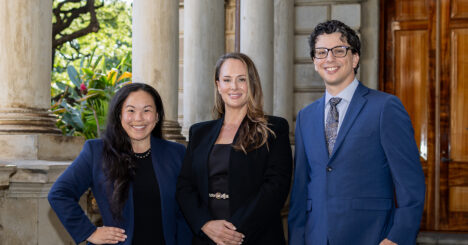A comprehensive estate plan allows you to direct how your assets will be distributed at your death and also who will manage your finances and your health in the event you become incapacitated. Various planning techniques are available depending upon your unique situation.
From a simple will to a complex trust, our Estate Planning attorneys will take the time to understand your goals and explain your options so that together we can craft the plan most appropriate for you.
What We Do:
- Trusts
- Wills
- Powers of Attorney
- Advance Health Care Directive
- Tangible Personal Property Lists
- HIPAA Authorizations
Our attorneys have decades of estate planning experience with individuals and families of all levels of wealth.
Below is a brief description of the documents that may be prepared as part of our estate planning package:
- Trust: A Revocable Living Trust (“RLT”) is a very common arrangement that can avoid probate and conservatorship court proceedings, while incorporating many tax-savings provisions. An RLT gives an individual greater control over the administration and distribution of his or her assets during life, and will frequently continue in effect after death. It is normally structured to take advantage of the basic estate-tax savings steps.An RLT is a contract with three parties: a Settlor (who establishes it), one or more Trustees (who manages and distributes the trust assets), and one or more Beneficiaries (who get the benefit of the trust). As a contract, it provides privacy (unlike a Will, which becomes a public document when probated). Being revocable, it can be amended at any time the Settlor is alive and has legal capacity (without the formalities of a Will). Because it avoids probate on the assets in the trust, the decedent’s estate will be settled much more quickly and assets distributed to your beneficiaries without being tied up in a court proceeding.In many cases, the Settlor, Trustee, and initial Beneficiary are all the same individual. A Successor Trustee is named in the RLT to take over if the Settlor/Trustee dies or becomes incapacitated. Once the Settlor dies, the trust assets normally are distributed to, or held for the benefit of, family members.Although an RLT normally costs more than a Will to establish and takes more effort to transfer assets into the trust name, the savings of money and time by the avoidance of conservatorship and probate proceedings and tax planning usually results in significant family savings over time.
- Will: Even though a typical estate plan will include an RLT, a Will is still needed in case there are assets that were not transferred to the RLT. A Will is used to pass property from one person to others at death, but it also can be used to exercise powers of appointment, nominate guardians for minor children or incapacitated relatives, and even establish trusts to control property in the future. Without a Will, state law determines who receives your property and in what shares.A Will does not avoid probate; it just gives you some control over what happens at your death.
- Power of Attorney: A Power of Attorney allows you to name trusted individuals to pay bills, handle your finances and sign documents on your behalf in the event of your incapacity.
- Advance Health Care Directive: An Advance Health Care Directive, sometimes known as a “Living Will,” allows you to designate trusted individuals to make health care decisions for you in the event of your incapacity and also allows you to make end of life decisions regarding life support and other types of health care when you are terminally ill or are in a coma with no reasonable expectation of recovery.
- Tangible Personal Property List: This list allows you to make gifts of tangible personal property (jewelry, books, furniture, cars, etc.) without the need for updating your will or trust.
- HIPAA Authorization: The HIPAA Authorization enables your Successor Trustee(s) (if applicable) and agents to access your medical records should they need to determine your capacity to handle your personal matters and to assist them in determining your medical care.
Please see our Wealth Preservation & Asset Protection page for discussion of more advanced planning techniques.















